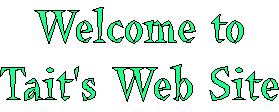


| Personal | Professional | Christian Stuff | Photographs | Miscellaneous | Blog |
Admin |

|

|

|
|||||||||
|
|||||||||||
| The infinitive is an indeclinable verbal noun. As such it participates
in some of the features of the verb and some of the noun. Like a verb,
the infinitive has tense and voice, but not person or mood. Its number
is always singular. Like the oblique moods (i.e., nonindicative moods),
the infinitive is normally negatived by me or ou. Like a noun, the
infinitive can have many of the case functions that an ordinary noun can
have. Although technically infinitives do not have gender, frequently the
neuter singular article is attached to them. [See Wallace for a discussion
of the various structures used with the different semantic categories of
the infinitive.]
The infinitive is used to indicate the purpose or goal of the action or state of its controlling verb. It answers the question "Why?" in that it looks ahead to the anticipated and intended result.
The infinitive of result indicates the outcome produced by the controlling verb. In this respect it is similar to the infinitive of purpose, but the former puts an emphasis on intention while the latter places the emphasis on effort. A number of instances are difficult to distinguish, leaving room for exegetical discussion. As a general guideline, however, if in doubt, label a given infinitive as purpose (it occurs almost four times as often as result).
This use of the infinitive indicates a temporal relationship between its action and the action of the controlling verb. It answers the question "When?" Many grammars confuse the categories "Antecedent time" and "Subsequent time"; see Wallace for a discussion.
The causal infinitive indicates the reason for the action of the controlling verb. In this respect, it answers the question "Why?" Unlike the infinitive of purpose, however, the causal infinitive gives a retrospective answer (i.e., it looks back to the ground or reason), while the purpose infinitive gives prospective answer (looking forward to the intended result).
The infinitive of means describes the way in which the action of the controlling verb is accomplished. In some respects this could be called an "epexegetical infinitive" (but we are reserving that term exclusively for the substantival infinitive). It answers the question "How?"
The infinitive is frequently used with "helper" verbs to complete their thought. Such verbs rarely occur without the infinitive.
An infinitive or an infinitive phrase sometimes functions as the subject of a finite verb. This category includes instances where the infinitive occurs with impersonal verbs such as dei, exestin, dokei, etc.
An infinitive or an infinitive phrase sometimes functions as the direct object of a finite verb.
This is the use of the infinitive (or infinitive phrase) after a verb perception or communication. The controlling verb introduces the indirect discourse, of which the infinitive is the main verb.
Like any other substantive, the substantival infinitives may stand in apposition to a noun, pronoun, or substantival adjective.
The epexegetical infinitive clarifies, explains, or qualifies a noun or adjective. This use of the infinitive is usually bound by certain lexical features of the noun or adjective. That is, they normally are words indicating ability, authority, desire, freedom, hope, need, obligation, or readiness.
|